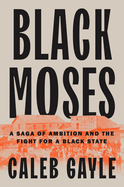
In Black Moses, Caleb Gayle (We Refuse to Forget) illuminates an often overlooked period in U.S. history: Black settlement in the American West. As Reconstruction faltered, the promise of freedom shifted into new forms of oppression. Thousands of Black people, called "Exodusters," undertook a mass exodus out of the South. They ended up in Kansas, Oklahoma, and other new territories that were created by forcing Native Americans onto smaller reservations.
Black Moses vividly portrays the pervasive inequalities of the Reconstruction era, when systemic racism and violence denied Black citizens their fundamental rights and ripped lands from their original Indigenous inhabitants. It focuses on these issues through the case of Edward McCabe, who envisioned an all-Black homeland in Oklahoma as a refuge from white supremacy. Born unenslaved in 1850 in Troy, N.Y., McCabe was educated and dared to dream of "an answer to the enduring question: What do we do with the Black people that America won't make adequate room for?"
McCabe's audacious ambition forms the heart of this saga. He first rose through the political ranks in Kansas, and then, once the Oklahoma Territory opened in 1889, he fought to promote his claim that "the advancement of Black people... might best be achieved in Oklahoma." After decades of activism, his struggle was ultimately unsuccessful, since "Oklahoma was becoming the South... a part of America where Black people were directed to accept separation and be satisfied with less." Although McCabe eventually died with his dream unrealized, Black Moses is a compelling testament to the vision of a man for a better future. --Jessica Howard, former bookseller, freelance book reviewer

